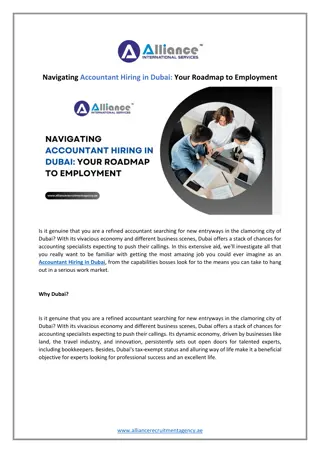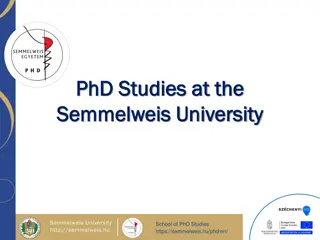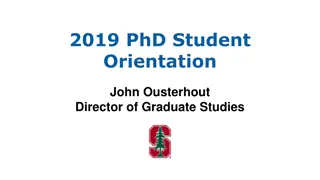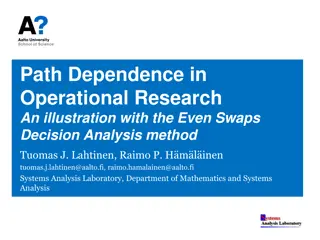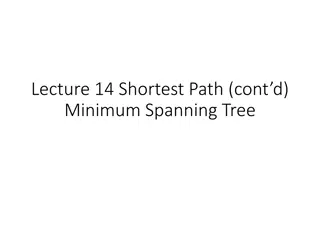Navigating the Path to a PhD: Essential Steps and Tips
Delve into the journey of pursuing a PhD degree in the UK and US. Discover key advice on narrowing interests, finding supervisors, preparing applications, and securing reference letters for a successful application. Uncover valuable insights on enhancing your prospects and standing out in the competitive academic landscape.
Download Presentation

Please find below an Image/Link to download the presentation.
The content on the website is provided AS IS for your information and personal use only. It may not be sold, licensed, or shared on other websites without obtaining consent from the author. Download presentation by click this link. If you encounter any issues during the download, it is possible that the publisher has removed the file from their server.
E N D
Presentation Transcript
How to get a PhD And other student tales In the UK: slides 2-13 In the US: slides 14-21
Before you start Narrow your interests to a few areas. This can be done by trying out lots of modules. In particular, try to take some fourth-year modules in your third year (even if you don t take them for credit). You can also go to the maths society weekly talks. Consider doing summer projects in your second and third years (e.g. URSS or through the LMS. There are many options once you start looking).
Where to start Get a supervisor for your fourth-year project (research projects are very much indicated for students willing to pursue a PhD). Talk to him and / or to relevant faculty members about suitable people and places given your area of interest. Contact these suitable people. Send a short email with your CV or transcript and see if they reply. This can really help in securing more interviews. Make sure you are aware of the various application deadlines for the universities you are interested in! (Typically Christmas / beginning of term 2) It is recommended that you apply to many places. Try to apply to at least 5 places and include some less prestigious universities as backup choice .
What do you need for your application? Name, date of birth, you know the drill A cover letter A CV Your HEAR transcript Reference letters (two for most unis, three for Oxford cos they re a bit posh ) The applications happen online (just google [Uni name] maths PhD application )
What does a successful application look like? The one part of your application that you shouldn t neglect is the reference letters. Typically the reference letters are written by your fourth-year supervisor and your personal tutor, but there are no obligations. Ideally you want people who somewhat know you and know how you work. A URSS supervisor is also a very good choice. Talk to people before you put their names in your applications! Typically unis ask for your referees details and contact them later. Obviously, a good transcript is also important.
Reference letters Perhaps the most important part of your application. These are direct testimonies about how you work in practice from experienced academics. It is VERY important that you be well on your way with your fourth- year project by the end of term 1, as this is typically when reference letters are sent. You really want to have impressed your fourth-year supervisor by then (and time goes faaaaaast).
Cover letters No need to freak out about them, but make sure they are well written. Usually one to two pages long. Typically includes (in no particular order): Short introduction Area(s) of interest (mathematical ones, your passion for kayaking goes at the bottom of your CV) A bit about your fourth-year project Relevant research experience (e.g. URSS) Other relevant experience (e.g. first-year supervisor, maths caf helper) A short paragraph where you explain why [Uni name] is the best uni for you and you re the best student for them
Transcript Being on track for a strong first (80 or above) will give you an advantage, but it is not a requirement! There are cases of people being accepted with low firsts. But you would need very enthusiastic referees. Research internships also make you look great (again, not a requirement!). Even with an average above 80, you are not guaranteed to get a PhD. It is important that you apply to several places to maximize your chances of getting an offer.
Stage 2: Getting interviews (It s not so bad)
How to prepare Typically lasts 30 min to one hour, usually happens between January and March. Not all professors ask mathematical questions, but there are still a few commonsense things to do to prepare. Make sure you are able to explain what your fourth-year project is about and what you have been doing so far (all the more reasons to start early). Try to remember the fundamental theorems in your area. Some examples of questions asked to our veterans: Tell us about your masters thesis (very common) Prove the Central Limit Theorem (for a PhD in probability theory) Prove the Intermediate Value Theorem Define some stuff related to your area of application
What to take away Interviews outcomes are unpredictable. A disastrous interview can still lead to an offer. Likewise, an interview that went well can lead to a rejection. So don t be depressed, but don t relax just yet either. The outcome doesn t just depend on you, it depends on the performance of students from all across the UK. It s also a good chance to meet with your potential PhD supervisor. Typically they will ask you if you have questions for them at the end of the interview. As an esteemed Professor once said: You may be stuck with that person for four years. Some marriages don t even last that long. Prof Jos Luis Rodrigo
Stage 3: Get your reply No pressure
Results Results arrive in your mailbox anytime after the interviews. If you get an offer, that s when you ll know your salary. Some unis also have a reply deadline, some as early as two weeks from the day they send you your offer. Don t lose hope if people around you start getting offers and you don t. Some people don t get any offer until the end of March. As long as you haven t received a rejection letter, there is still hope.
Bonus: How to apply in the US Welcome to the land of capitalism
Differences between the US and UK systems US PhDs are longer (5 to 6 years). Typically spend the first year taking advanced courses and only start research in your second year. This leaves you with more time and more freedom to choose your supervisor. By the end of your first year you ll know as much as if you had taken most fourth-year advanced analysis + geometry + topology courses at Warwick. Salaries are higher than the UK, but the cost of living is higher as well. But you should still have enough to sustain yourself.
Where to start EARLY (at the end of your third year / early July or August). Be prepared to spend at least $1000 in the process (maybe more depending on how many universities you want to apply to). Keep in mind US applications deadlines are earlier than in the UK (as soon as December 1st)!
What youll need Legal details, transcript, cover letter. THREE reference letters. You need to pay an administration fee to each university you apply to (ranges from $65 to $140 roughly, the more prestigious the university the more expensive). General GRE and Maths GRE ($355 + $27 per university you want to send your results to after the first five universities). Note that US undergrads don t need a master to apply for PhD. They are required to get their research experience elsewhere, so make sure to brag about yours too.
The GREs (Graduate Records Examinations) You can take both GREs in the UK. The general GRE can be taken all year round in various test centers across the UK / Europe (there is one in Birmingham). Think of it as a high school test on steroids. It has three parts: analytical writing, verbal reasoning and quantitative reasoning (easy-peasy maths). You WILL need to prepare, at least for the first two. You can take it as many times as you want, but registration costs $150. The maths GRE is where things get funky
The Maths GRE Only happens three times a year in April, September and October. Only two test centers in the UK: in London and Leicester. Technically registration is open until about a month before test dates. But UK test centers fill up VERY quickly, so book your seat ASAP if you don t want to have to sit your test in Finland or Bulgaria You will also need to prepare. Registration costs $205 (+ travel expenses and hotel, can be expensive if you need a flight to Finland ). You should apply for this in early July or August. You can still apply in September, but you will very likely have to travel.
How to prepare for the GRE There are some resources online, but free, legally obtained resources are scarce (you can find some past papers and original exercises for the Maths GRE here: https://math.uchicago.edu/~min/GRE/) There are a lot of books which you can buy to help you prepare. Maths GRE essentially includes material from all first- and second- year core modules + some basic measure theory and complex analysis. On the bright side, this is a very good way to remind yourself or earlier material if you are planning on becoming a first-year supervisor
Results You don t need to pass any interviews. This means that they will judge you solely based on your application documents. Having solid grades is vital. Having a famous referee can help too. If you get an offer, you will have until April 15thto reply (but they do appreciate if you reply sooner). If you decide to go to the US, universities have a lot of resources to help new international graduate students settle in the US. In particular, they will help you with your visa and health insurance (typically universities have their own health insurance program for their students, and is quite advantageous).




